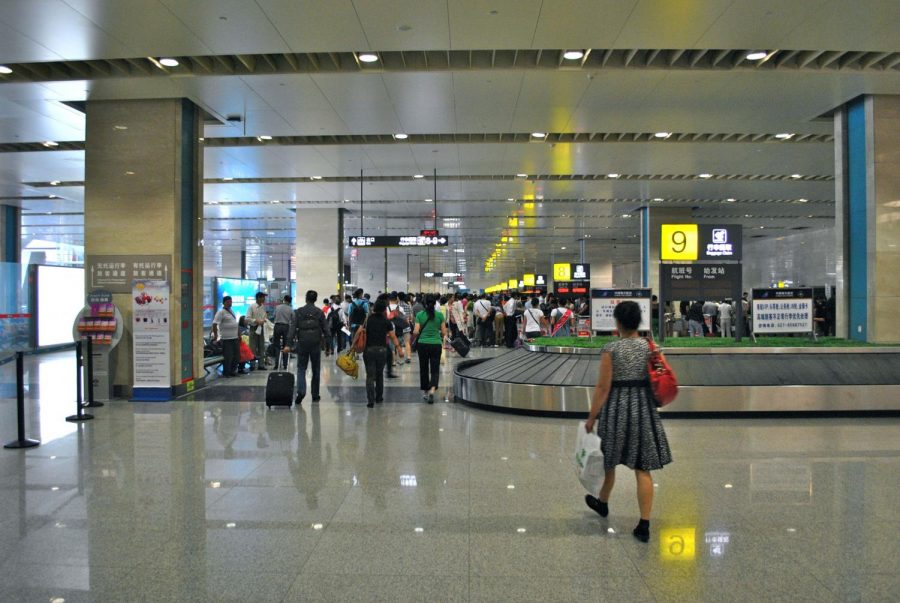COVID-19 Travel Bans: What’s Up With That?
Photo courtesy of Wikimedia Commons
Wuhan Tianhe Airport
“Travel bans affect people like my grandparents who live in China,” said Grace Sun (‘23). “This year, they came to the United States during Christmas, but due to the Chinese travel restrictions, they cannot go back to China for a while.” As the number of COVID infected individuals continues to rise around the globe, countries and governments are taking action to limit traveling in an effort to reduce the spread of the virus. Both cautions against nonessential trips and worldwide travel limitations have been put in place. Airport closings, the discontinuation of flights, and regional quarantine are just a few of the actions countries are utilizing to help contain the virus.
Starting on March 11, President Donald Trump made the decision to ban the entrance of all individuals who had recently been to China, Iran, or a number of European countries. For those who were attempting to return to the United States, they are only allowed to arrive at certain airports that are equipped with enhanced screening tests for COVID-19. Additionally, on March 20, the White House Coronavirus Task Force announced that they were barring any unnecessary travel to or from Mexico, effective on March 21. This statement came a few days after President Trump proclaimed that the United States and Canada were making the mutual decision of closing their border. On March 31, the Department of State announced a “Level 4” warning, the highest travel advisory level a federal agency can issue. They stated that United States citizens should avoid any international travel due to the global impact of COVID-19.
Other countries also have been taking similar action in limiting the entry of travelers and potential infections. Starting in January, China began to set up more measures that deal with cases from abroad, for example, with Beijing and other areas requiring international travelers to go into a 14-day quarantine upon arrival. In an effort to control the number of imported cases of the coronavirus, China’s foreign ministry announced on March 26 that they were restricting practically all entry to the country by nonnatives and would be suspending almost all worldwide commuter flights as well. Foreign residents and foreigners with issued visas beforehand would no longer be permitted to enter and stay in the country starting on March 27. However, it is reported that foreign citizens arriving in China for “necessary economic, trade, scientific or technological activities or out of emergency humanitarian needs” can still apply for visas.
More than 130 countries have now begun some form of travel restriction since the COVID-19 outbreak began, whether it be screening recent arrivals to the country, quarantine, or flat-out banning travel from certain areas. Some reasons against travel bans are that these restrictions might interrupt the delivery of needed aid and technical support, as well as the risk of giving a false sense of security to countries. Another reason is that citizens of countries in quarantine are feeling trapped by these regulations and laws surrounding travel bans. “Because of the barring of international travel in India, my relatives are in lockdown there with no way of leaving the country,” explained Anjali Sethi (‘23).
The World Health Organization (WHO) said that the travel restrictions in Africa are concerning the delivery of supplies and workers essential for containing COVID-19. On The Lancet, a weekly peer-reviewed general medical journal, Michel Yao, the head of WHO’s contingency procedures in Africa, explained the situation. “There are 47 countries not allowing any airlines to land, and we need to support them with equipment, especially as we cannot send any experts to give technical support, for example, with contact tracing or analysis”, she said. “There is a big shortage of ventilators and also intensive care unit capacity. There are only about 3000 doctors who have intensive care unit expertise in all of Africa.”
“I believe that the severity of the bans depends on the severity of the virus in each respective country,” Grace said. Countries around the globe are increasingly embracing extensive measures, including complete lockdowns, closing airports, imposing travel restrictions, and completely sealing their borders, to contain COVID-19. The travel bans utilized by countries around the world are widely debated regarding its pros and cons. “Efforts to encourage self-imposed travel restrictions, social distancing, and quarantine would be more effective in regards to reducing exposure to non-infected individuals and controlling the spread of new infections,” she elaborated.

Crystal Li joined The Tower in her freshman year when she moved from Shanghai to San Diego in 2019. Now a senior, she fondly looks back on the four-year...












